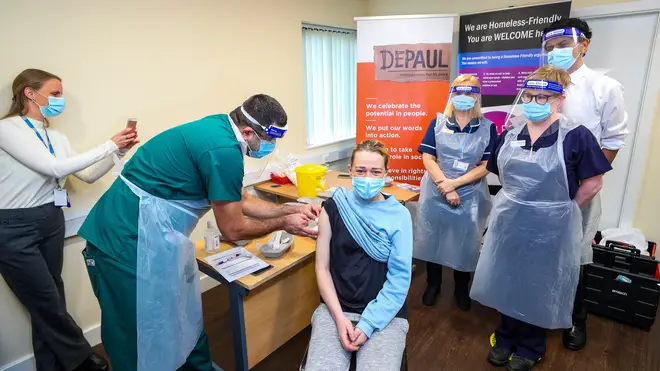
James O'Brien 10am - 1pm
19 January 2021, 07:41

People are being urged to keep following Covid-19 rules amid warnings the population could start relaxing their guard as the vaccine becomes increasingly available.
The vaccine rollout is in full flow in the UK, with over 4 million doses now given. The Government is aiming for at least 15 million jabs to have been administered by mid February.
The latest minutes of the Scientific Advisory Group for Emergencies (Sage), released last week, called for close monitoring of the situation with a system of "rapid alerts" if adherence to the rules begins to fall off.
"There is a risk that changes in behaviour could offset the benefits of vaccination, particularly in the early months of vaccine rollout," it said.
At a No 10 news conference on Monday, Health Secretary Matt Hancock issued a direct appeal to the public, saying: "Don't blow it now."

NHS is under significant pressure 'in all parts of the country'
NHS England's medical director Professor Stephen Powis said that with around 15,000 hospital admissions with coronavirus since Christmas Eve, the pressures on the service would continue for some time to come.
"It is absolutely critical that we continue to stick to those social distancing rules that are in place. That we don't rely yet on vaccines coming to our rescue," he said.
Read more: First Covid-19 vaccine jabs given to over 4m people as Hancock says 'don't blow it now'
"It will be some time before the effects of the vaccination programme are seen through into reducing pressure on hospitals. We all have a role to play in reducing the risk of transmission."
The Government says it is on track to vaccinate around 15 million high-priority people across the UK by February 15, including frontline health and social care staff, the over 70s and people in care homes.
Once those vaccines have taken effect, around two to three weeks later ministers will consider whether lockdown measures can be eased in England.

UK has highest Covid death rate per million people in world over past seven days
Despite pressure from Tory MPs to move as quickly as possible, Boris Johnson has warned there will be no "open sesame" moment when restrictions will all be lifted together.
Speaking during visit to a manufacturing facility for the Oxford/AstraZeneca vaccine on Monday, the Prime Minister said the UK was still in a "pretty precarious" position and that any loosening would be gradual.
With more than half of the over 80s and half of elderly care home residents having received the jab, ministers have given the go ahead to begin vaccinating the next priority groups - the over 70s and the clinically extremely vulnerable.
Mr Hancock acknowledged that some areas of the country had made better progress than others but said they were putting more supplies of the vaccine into those that were falling behind.
"What we're doing now is making sure that whilst they, of course, will be able to move onto the next group, we're prioritising the supply of the vaccine into those parts of the country that need to complete the over-80s," he said.
"But we don't want to stop the areas that have effectively done that job already, we want them to carry on, but the priority of the vaccine is according to the JCVI (Joint Committee on Vaccination and Immunisation) prioritisation list.
"The critical thing is to make sure that everybody can get it, that we're putting more supply into the areas that have got more to do."
Read more: 'Catastrophic moral failure' if Covid vaccines not distributed fairly, WHO warns
First Minister Nicola Sturgeon said she was "hopeful" that all adults in Scotland would have been given their first dose of coronavirus vaccine by September.
Wales has faced criticism in the past week for vaccinating fewer people in proportion to its population than the other home nations.
As of Saturday, 4% of the population in Wales had been vaccinated, compared with 4.1% in Scotland, 5.9% in England and 7.4% in Northern Ireland.
First Minister Mark Drakeford dismissed the statistics as "very marginal differences" and insisted Wales was "on track" to vaccinate the top four priority groups by the middle of February, with almost 152,000 having received their first injection.